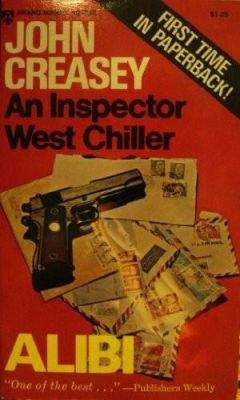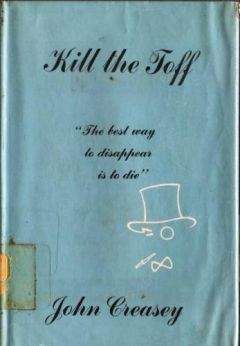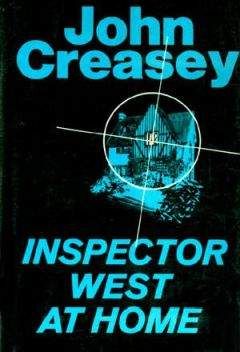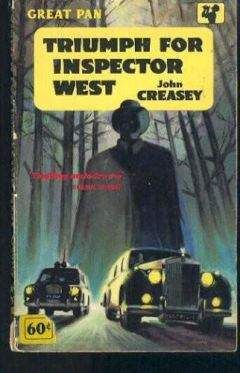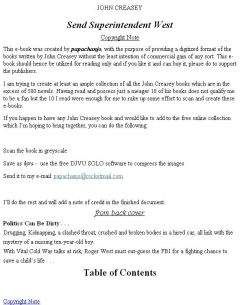John Creasey - Inspector West Alone
На сайте mybooks.club вы можете бесплатно читать книги онлайн без регистрации, включая John Creasey - Inspector West Alone. Жанр: Прочее издательство неизвестно,. Доступна полная версия книги с кратким содержанием для предварительного ознакомления, аннотацией (предисловием), рецензиями от других читателей и их экспертным мнением.
Кроме того, на сайте mybooks.club вы найдете множество новинок, которые стоит прочитать.
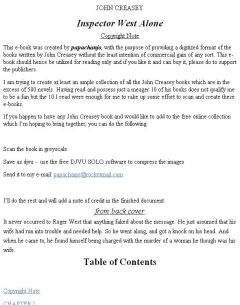
John Creasey - Inspector West Alone краткое содержание
Inspector West Alone читать онлайн бесплатно
He lost consciousness.
* * * *
He groaned. Someone spoke, softly, soothingly. He groaned again, but not from pain. There was no pain, only fear of something he could not comprehend.
A hand was at his shoulder, and the voice came again.
He tried to open his eyes.
He could not.
Panic, a hundred times worse than when he had been in the chair, took hold of him and shook him violently, his whole body seemed to be in physical turmoil. He felt pressure on his hands and—worse—on his eyes; that was why he couldn’t open them, something pressed firmly against the lids. That wasn’t all; there was pressure against his cheeks, chin, lips, and throat, a constricting pressure, as if his face were in a special “strait jacket”.
“Mr. West!”
He knew that voice.
“Please don’t struggle, please don’t.”
Was he struggling? He felt as if he were convulsed by forces stronger than himself. But he became calmer and more conscious of the gentle pressure of Marion’s hands.
“You’ll be all right,” she promised, “you’ll be all right.”
He was still; and he was hot; prickly heat affected his whole body, and there was a warm glow over his face. He tried to speak, and couldn’t move his lips.
“Don’t try to speak yet. You’ll be all right. You’ve had an operation on your face.”
He lay quite still, aware of the stiff warmth of his face, clearly understanding what had happened. The sparrow was a plastic surgeon; Kennedy had talked of the second stage in the transformation of Roger West—a transformation in his looks, of course.
He moved his right hand.
He felt the same warm stiffness at the tips of his fingers —so they’d taken the skin off them, and grafted new, to prevent identification through his finger-prints. But the prints would grow again; didn’t they know that?
“I’m going to help you to sit up,” said Marion. “Then I’ll feed you.”
Her arms were young and strong, and soon he reclined comfortably against the pillow. She put something to his lips and it seemed hard, cold, and round; like a cigarette. It was a rubber tube. Warm sweetness filled his mouth and he gurgled as it ran down his gullet.
“Are you fairly comfortable? Just nod.”
He nodded.
“Is there anything you want?”
He wanted freedom; Janet; the boys; all the things which were impossible to have. He shook his head.
“I’ll come and see you again, soon.”
He wanted to ask how long this would go on, but he couldn’t move his lips, and so had to let her go.
An hour or an age passed before she was back.
* * * *
“Mr. West, I want you to listen carefully to all I have to say.”
He nodded.
“You can talk now, if you try. Your lips are free of the bandages, but your chin and nose aren’t. If you try to talk without moving your lips much, you’ll manage.”
Old lags knew that trick; he’d often demonstrated for fun, and sent the boys off into peals of laughter. He tried now.
“Okay. I can hear.” The voice didn’t sound like his own.
Had they changed that?
“You’ll be here just for a day or two, and after that more of the bandages will be taken away and you’ll feel easier.”
“Okay.”
“There’s a cord above your head. Pull it if you want someone to come.”
“Thanks.”
“Would you like the radio?”
“No!”
“If you would, just pull the cord. And please remember this. I want to do everything I can to help. I know who you are now, I’ve seen the newspapers, and——”
She broke off in a choking voice, and he heard her rush out of the room.
* * * *
Routine.
Special feeding, liquids only; visits once a day from the sparrow. Radio music in half-hour doses. After the third day, some of the bandages were removed. The burning sensation went completely, but his face and fingers felt numb.
Routine: practise speaking; practise moving his fingers. Radio music; dull radio comedians, bright radio comediennes—no news. Never any news.
Routine: look forward to Marion’s visits. Wait for them. Hear a faint sound and hope she had entered. Feel sick with disappointment if she hadn’t, exhilarated if she had. Routine: stop thinking about Janet. Stop it, stop it! Stop an avalanche, stop the waves, stop thinking about Janet and about the boys.
Each day for seven days a little more of the bandage was removed.
On the eighth day, the awful darkness lifted, for the bandages and pads were removed from his eyes. He opened them to a subdued light, and the hazy face of the sparrow in front of him—a perky, peering sparrow, who seemed fully satisfied with the results.
“Two or three days now, and you’ll be all right, quite all right; perfectly satisfactory case. No complications. You’ll be weak, but you’ll get strong quickly.”
Routine: wait.
CHAPTER X
NEW MAN
RAIN hissed and spattered against the windows, heavy grey clouds hung low, and the garden was a sorry drenched mass. Many of the daffodils were dead or dying, and there was little colour in the borders, except green.
Roger stood there, looking out.
The door opened. Marion ? His heart leapt, because hers was the only friendly voice and friendly face. But this was the sparrow, and Kennedy was with him. Kennedy nodded and smiled, as if in an affable mood.
“Good morning!” The sparrow rubbed his hands together briskly. “Feeling better?”
“Yes.”
“Good, good. Come and sit down.”
Roger sat in a chair in front of the mirror. The pale white bandages covered most of his face, and he had become familiar with the “new” eyes, nose, and mouth since seeing them three days ago. They made him different.
Kennedy stood behind him, looking at his reflection in the mirror.
“Now!” chirrupped the sparrow.
Bright scissors snipped the bandages at the back of Roger’s head, nimble but gentle fingers plucked the gauzy stuff away, and it peeled off, almost like a skin. There were several layers. Roger gripped the arms of his chair and deliberately closed his eyes. The sparrow said: “There!” After that there was silence, until Kennedy spoke in a marvelling voice.
“Wonderful!”
“Yes, yes, it’s good. I knew you’d be satisfied.”
Kennedy sneered: “Aren’t you going to look at yourself, West?”
Roger clenched his teeth, and his fingers seemed stuck to the arms of his chair. He could imagine the delight in the sparrow’s eyes and the gloating satisfaction in Kennedy’s. Very slowly, he opened his eyes. The vague shape of his head and shoulders appeared first, and he stared as through a mist. That cleared.
He looked into the face of a stranger.
It wasn’t a bad face; not evil. His good looks had turned into ruggedness. His nose was broader at the bridge, his eyes were narrower—he knew that skin had been taken out of the corners. His chin jutted, and seemed less pointed. His lips were thinner, but not turned down at the corners. As a face there wasn’t much the matter with it, but it wasn’t his. His usually long and wavy fair hair was cut very short, showing the shape of his head.
* * * *
After the others had gone, Marion came in. She saw him sitting by the window, gazing out on to the rainswept garden and a prospect as desolate as his own future. She came slowly and softly, as if afraid of what she was going to see. He wouldn’t turn his head, made her come round in front of him. She put her hands to her breast and opened her mouth as if to cry out, but no sound came.
Roger growled: “Satisfied with your share in it?” It was hard to say why he felt that he had to be harsh with her.
“I’ve tried to help.” She was near tears.
“And this is the result.”
“If only you’d let me send for others——”
“Let you! Did I stop you?”
“Yes,” she said. “I didn’t tell the police because I thought you were afraid of them. I wanted to help you. I’d give my life to help you. I didn’t care—I don’t care—whether you killed her or not.”
“I didn’t.”
“Then why didn’t you let me——”
“Oh, forget it.” He stood up abruptly. “All right, Marion. Tell me how it is you’ve been nursing me since you stopped thinking I was mad. You know that your precious Dr. Ritter and my dear friend Mr. Kennedy are crooks, don’t you?”
“I—yes.”
“You knew all the time—didn’t you?”
“No,” she said dully. “I’d no idea there was anything wrong when you first came. After I’d looked after you. Dr. Ritter told me that you’d killed that girl and had to be—changed. He gave me the chance of helping you. I took it. I had to take it. I think he knew why.”
“Why?”
“I love you,” she said.
* * * *
Was she lying ?
* * * *
Or was she trying this way to win his confidence? Was she a tool of Kennedy’s, or simply a victim?
Kennedy was in the lounge downstairs when Roger went in. He put down a newspaper and raised a hand.
“Hallo, West. Are you as well as you look?”
“I’m all right.”
“Good. After a spell like you’ve had, you want to get back into civilization slowly. I’m going to let you take Marion around a bit. You’ll both be closely watched, but I don’t think you’ll try any funny stuff.”
“I’m tired of doing nothing.”
“I’ve plenty of work for you—when I’m ready. For a start, here are the newspapers for the past ten days. Get yourself up to date with the news. Then you can take Marion to the flicks. Dance around a bit, afterwards, start living.”
He went out.
Roger read newspapers until he could take in nothing more.
The Copse Cottage murder had gradually faded from the Daily Cry, and the story of his disappearance replaced it. The disappearance of Roger West was—or had been, it was deep in the past already—a nine-days wonder. But there had been no official connection between that and the murder, all the statements were guarded. Only one thing hurt: a photograph of Janet. An obsession began to take hold of him: he must get word to his wife. If she received even a hint that he was alive, then he could rely on her faith to help her over the agony she was suffering now.
Marion? Could he trust her?
* * * *
A weak sun pierced the clouds, birds chattered, the air was fresh, crisp, exhilarating. Roger, dressed in well-made new clothes, stood beside Marion, by a small car, outside the front of the house. Beyond were dripping trees and hedges, and great fields, where a few cattle grazed. He could see no other sign of habitation.
“Get in,” he said.
Marion climbed in.
She wore a red plastic raincoat over a blue dress. Her eyes sparkled, her freshness seemed to match the day, fears were gone, and she was set fair for enjoyment: being with him. They settled down, and their chauffeur, the male nurse, let in the clutch. This winding road led for miles between trees, and then they came upon a main road. There were telegraph poles, wires, cars, lorries, the half-forgotten things. They passed through a village where a constable stood leaning on his bicycle, talking to two old men.
They came to a town.
It was bustling and pleasant, had a friendly atmosphere. The streets and wide market-place were thronged with people, cars, single-decker buses, a few horses and traps. The nurse took them to a car park, near a huge Odeon Cinema.
“Do you want to see a film at once?” he asked Marion
“We’re to go to tea at the Royal, first.”
He was mingling with ordinary people again, and felt numbed with the strangeness. There were several policemen here; none showed any interest in him, yet each would have scored a rousing triumph had he guessed.
Marion held tightly on to his arm.
No one appeared to follow them, but he was sure that they were being watched wherever they went; that sixth sense which came from years of experience hadn’t died. They came upon a large hotel, where a sign outside read : Tea Dance, Daily, 3s. 6d.
“Where are we?” Roger asked.
“Worcester.”
He recalled it, now. The old town cheek by jowl with the new. They went in. The atmosphere was friendly, a good band was playing, but only three couples were dancing, half a dozen others sitting round a large room. The waiter came up promptly.
They danced; Marion was as light as a feather.
“If we could go on like this,” she said.
He nodded, but made no comment. Her presence hurt because she reminded him of Janet in her complete contentment at being with him. He danced mechanically a quick-step with a gay lilt and quickening rhythm.
Then he saw a couple enter; and he froze.
Marion said: “Don’t look like that!” He turned away, but looked at the new-comers out of the corner of his eye. It wasn’t fancy. His blood ran hot, he missed a step again. Marion asked urgently:
“What is it?”
He didn’t answer, but led her towards their table, feeling physically sick and racked with pain. The new-comers looked around—man and woman.
Man—and JANET.
* * * *
The man was Mark Lessing, Roger’s one close friend.
* * * *
“What is it?” demanded Marion. “Please tell me.”
“Never mind.”
“Have you seen someone you know?”
“Yes. Please don’t talk.”
She fell into a reluctant silence. Janet took off her coat, the now shabby black sealskin which he had bought her years ago. Mark put it over the back of her chair, Janet was sideways towards Roger, not five yards away. She began to look round her, and he hated what he saw in her grey-green eyes. She was older—careworn and tense. Her hands were clenched in her lap. Her eyes sought out every man here, and Roger knew she was looking for him. She’d come here, hoping to see him, but the hope was already dying. She looked at him, but her gaze didn’t linger for a moment; she showed no interest in Marion.
Her eyes were so tired, her hair, dark yet usually so full of light, had lost its lustre. Mark Lessing gave her a cigarette, and she began to smoke nervously, agitatedly.
Mark sat back, looking about him with less obvious tension than Janet, but eagerly, searchingly. He was good-looking—in his way, handsome. His expression was austere, and those who did not know him well took him for a snob. His skin was rather sallow, his dark hair was wavy, and worn too long; it looked affected.
No two people knew Roger so well.
“Please tell me,” Marion whispered.
“A friend—of mine.”
“Oh. Kennedy——”
“Sent us here. This is a test of my nerves and goodwill. I’d rather not talk.”
“It’s your wife isn’t it?” Marion said in a flat voice.
Roger nodded.
“She’s——”
“Don’t.”
“She’s very sweet.”
“Let’s get out of here!”
“No! Kennedy’s watching.” Marion feared Kennedy so much.
Похожие книги на "Inspector West Alone", John Creasey
John Creasey читать все книги автора по порядку
John Creasey - все книги автора в одном месте читать по порядку полные версии на сайте онлайн библиотеки mybooks.club.
